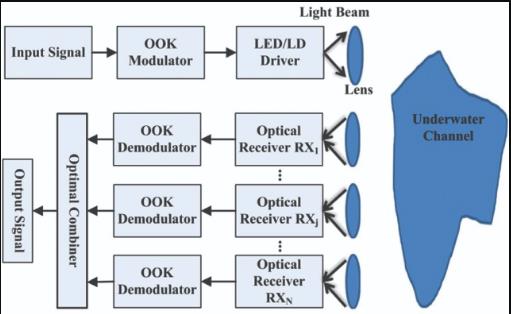On Performance of Underwater Wireless Optical Communications Under Turbulence
Objective
In this paper, we consider the impact of turbulence on performance of UWOC systems and investigate capacity and bit-error-rate (BER) of underwater wireless optical links under weak and strong turbulence by deriving the expressions of average capacity and BER.
Abstract
In this project, we consider the impact of turbulence on performance of UWOC systems and investigate capacity and bit-error rate (BER) of underwater wireless optical links under weak and strong turbulence by deriving the expressions of average capacity and BER.
Numerical results suggest that turbulence degrades both capacity and BER performance as expected. This work provides a theoretical analysis tool for system design and performance evaluation of UWOC systems.
Keywords: Underwater Wireless Optical Communication (UWOC), Channel Capacity, BER, Turbulence.
NOTE: Without the concern of our team, please don't submit to the college. This Abstract varies based on student requirements.
Block Diagram

Specifications
Software: Matlab 2018a or above
Hardware:
Operating Systems:
- Windows 10
- Windows 7 Service Pack 1
- Windows Server 2019
- Windows Server 2016
Processors:
Minimum: Any Intel or AMD x86-64 processor
Recommended: Any Intel or AMD x86-64 processor with four logical cores and AVX2 instruction set support
Disk:
Minimum: 2.9 GB of HDD space for MATLAB only, 5-8 GB for a typical installation
Recommended: An SSD is recommended A full installation of all Math Works products may take up to 29 GB of disk space
RAM:
Minimum: 4 GB
Recommended: 8 GB
Learning Outcomes
- Introduction to Matlab
- What is EISPACK & LINPACK
- How to start with MATLAB
- About Matlab language
- Matlab coding skills
- About tools & libraries
- Application Program Interface in Matlab
- About Matlab desktop
- How to use Matlab editor to create M-Files
- Features of Matlab
- Basics on Matlab
- Basics of wireless communications
- About D2D communications
- How system modal can be formed in Matlab.
- Construction of algorithm according to system modal
- Analyzing and visualization of plots.
- Phases of data transmission:
- Generation of input signal
- Construction of transmitter
- Formation of channel
- Construction of receiver
- About Optical communications.
- About under water channels
- About Deep Learning
- About OOK modulation techniques.
- About optimal combiner for optimization techniques.
- How to extend our work to another real time applications
- Project development Skills
- Problem analyzing skills
- Problem solving skills
- Creativity and imaginary skills
- Programming skills
- Deployment
- Testing skills
- Debugging skills
- Project presentation skills
- Thesis writing skills





 Paper Publishing
Paper Publishing
